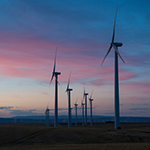
Projects
Explore the ambitious research programme that allows us to address key issues in sustainability.
-

Contemporary crises and net zero transitions: Ukraine, COVID, and energy (CANUTE)
The project explores the question: How are the contemporary crises of the Russian invasion of Ukraine and the character of post-COVID recoveries affecting the pursuit of ambitious climate policy towards ‘net zero emissions’?
Read more
-

Cottonopolis: lessons for environmental science through the lens of Manchester
Exploring the archives of ‘cotton’ to unsettle the celebration of Manchester’s history as a city of science and innovation.
Read more
-

Digital platforms and the future of urban mobility
Researching how digital platforms are reshaping urban mobility systems.
Read more
-

Green energy transitions and global disruption: The (un)just transition to Net Zero
This project researches green energy transitions and global disruption in the transition to Net Zero.
Read more
-

IMAGINE: Contested Futures of Sustainability
This 3-year project, funded by the Norwegian Research Council, sets out to study images of the future as imaginaries in a sustainable future.
Read more
-

Joined Up Sustainability Transformations (JUST)
JUST is a major research initiative focused on the pursuit of sustainability transformations that are people-centred, ‘joined-up’ and socially just. It seeks to accelerate understanding of a just transition through coordinating research into action at all levels of society.
Read more
-

Net Zero Populism
This project focuses on net zero policies and it contributes to the development of the SCI’s strand of work on the politics of unsustainability.
Read more
-

One bin to rule them all
Improving compliance with recycling by developing ‘One bin’ to hold all plastic-like items as well as improving recycling infrastructure.
Read more
-

The business of food poverty: Mapping relationships and strategies of key actors in an emerging field
Examining the webs of influence, interests, and tensions between food charities, food surplus distributors, and their corporate partners.
Read more
-

The evolution of green-tech SMEs in East and South Africa: scoping emerging business models
The project aims to develop a deeper understanding of the emerging green-tech SME business models.
Read more
-

The Future of British Climate Strategy
The project aims to focus on UK climate policy and strategy to build on the previous internally funded project on net zero populism.
Read more
-

The political economies of plastic packaging recycling
Addressing persistent challenges concerning recyclability in and beyond Greater Manchester.
Read more
-

The Waste Tip: Exploring fly-tipping and opportunities for better waste management (Fly-tipping)
‘The Waste Tip’ aims to explore the phenomena of fly-tipping through an interdisciplinary lens.
Read more
-

Toward a ‘green recovery’ in food provision: Influencing policy in Manchester
Developing proposals for how to use the COVID-19 recovery as an opportunity to shift toward healthier, more equitable, more sustainable, and zero-carbon food systems.
Read more
-

Toward socially just climate finance: Insights from the Brazilian Amazon
This project collaborates with the German GIZ and the Brazilian BNDES/ Amazon Fund for Forest Conservation and Climate Protection to better understand sustainable development implications of cross-cutting social issues, including gender and human rights, in climate finance mechanisms.
Read more
-

Towards Inclusive Environmental Sustainability (TIES)
Exploring how the knowledge and practices of immigrants from the Global South contribute to building just and sustainable cities in the Global North.
Read more
-

Young people at a crossroads
Negotiations of environmental knowledges, practices and subjectivities in immigrant homes at a time of climate crisis.
Read more





.jpg)











